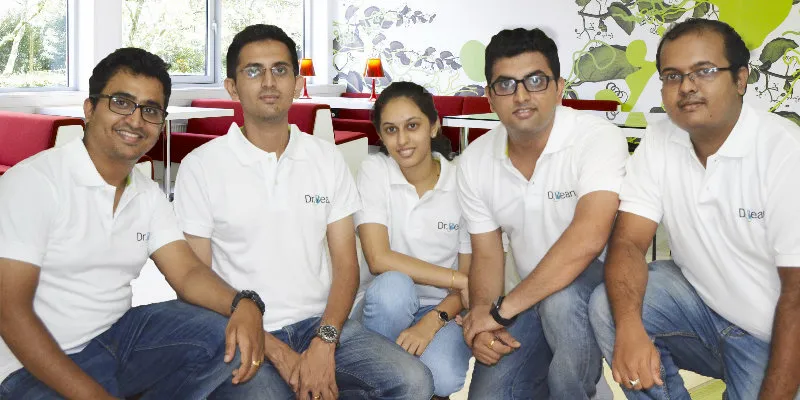Connected healthcare platform Dr. Bean on-boarded 4,000 doctors and 10,000 users within six months
Last July, when Anoop Sharma had a viral fever within frequent intervals, his friends, Ashwyn Sreekantaswamy and Ramakrishna Subbanna, were worried. They waited around for two days to get to meet doctors and finally took him to a famous hospital in Bengaluru. Adding to the woes, the blood test report took more than 24 hours, as the apparatus required was at another location.

But this struggle to find a doctor was not a one-off experience for Anoop (28). Despite spending close to seven years in Bengaluru, he found it difficult to meet doctors, get diagnosed and avail prescribed medicines. From his stay in the hospital to post discharge, the three friends got a first-hand experience of the mess around the whole system. This made them realise the need for technology, which could provides users standardised, easily accessibile and affordable medical attention.
Soon, the trio translated this problem into a business opportunity and started Ringabell Health Pvt Ltd., last November, under which they operate a brand called Dr. Bean.
Bengaluru-based Dr.Bean is a connected healthcare platform and a one stop solution for all primary healthcare needs. It focusses primarily on medicine delivery, diagnostics services and doctor appointments.
With Dr. Bean platform, patients need not have to wait for more than 15 minutes for doctor consultation, while managing all health records electronically. Users can also get prescribed medicines and diagnostics services delivered at doorstep.
We did a major field study speaking to a lot of patients, pharmacists and doctors and realised that technology and convenience is the need of the hour for everyone,” says Anoop, a mechanical engineer from Visvesvaraya Technological University. He has worked with Volvo Trucks and Toyota India in the past.
Ashwyn (23) is an electronics and communication engineer from Visvesvaraya Technological University and worked with Nokia developing solutions, while Ramakrishna (31) is a commerce graduate and has worked with Volvo Trucks, where he led supply-chain strategies for the Asia Pacific region.
Started in an apartment
The trio started Dr. Bean in Anoop’s apartment in Basavanagudi, Bengaluru, with a capital of Rs four lakh. It then took a significant amount of time to convince technology-averse doctors, pharmacists and diagnostic centres.
Now, Dr. Bean has more than 4,000 doctors, 50 pharmacies and 10 diagnostic centres on its platform. Its Android app currently has more than 10,000 users in Bengaluru, and the team aims to increase it to 5,000 by August.
Partnerships and growth plans
Dr. Bean has partnered with Ola Cabs, to allow users to book rides for doctor appointments or to a diagnostic centre. In a strategic tie-up with Star Health Insurance, Dr. Bean offers customised insurance packages to users who are above 60 and those who do not get insurance facilities for chronic diseases.
The company is also in talks with HDFC Bank to serve its 75,000 employees, and is also looking at making it its banking partner.
According to Anoop, Dr. Bean generates revenue on every transaction and charge subscription from its suppliers for facilitating them with their software. Their current conversion rate is between five and 10 percent.
By the end of this year, the startup hopes to extend its services to Delhi, Mumbai, Hyderabad, Chennai, Ahmedabad, Trivandrum and Kolkata. Rural penetration is also a part of it expansion strategy, and will likely execute it by 2018. In the next fiscal year, Dr. Bean aims to have 5,000 transactions per day, with an average ticket size of Rs 1,500.
Health 2.0- The new era of healthcare space
With the introduction of Health 2.0 in the mid-2000s and the mushrooming of digital healthcare startups, the sector has taken new shape in the last decade. Department of Industry Policy and Promotion revealed that FDI investment in hospitals and diagnostic centres totalled $3.21 billion in 2000-15. According to IBEF, the healthcare market in India was worth close to $100 billion as of 2015 and is expected to touch $280 billion by 2020, clocking a CAGR of 22.9 percent.
Tencent-backed Practo, Accel Partner-backed Portea Medical, Ratan Tata backed Lybrate, Medwell Ventures and MedGenome are some of the some of the names in the digital healthcare space. Medwell raised $10 million from Fidelity Growth Partners India (FGPI) and Fidelity Biosciences, whereas MedGenome raised $20 million from Sequoia Capital.







